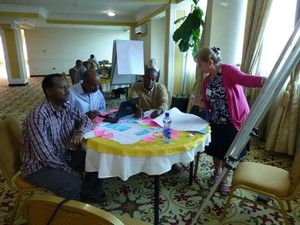The significance of learning and sharing for the OWNP
Think back to the four guiding principles of the OWNP that were discussed in Study Session 4: integration, alignment, harmonisation and partnership. To enact and follow these principles requires collaboration among stakeholders, and part of that process is learning and sharing. All the partners in the OWNP have knowledge and expertise that can be shared with others who learn from that experience, which in turn brings benefits to the Programme as a whole. Planners and implementers at all levels become more effective if they can learn from others about successful ways of working, and also learn of past mistakes that can then be avoided in future. The central unifying focus of the OWNP, characterised by the motto ‘One Plan, One Budget, One Report’, is dependent on a system that encourages learning and sharing among stakeholders.
In Study Session 9 you were introduced to the Water Sector Working Group and its secretariat. The objectives of this group include providing a forum for sharing experiences and exchanging information between WASH partners and acting as a knowledge hub for the entire water sector. The secretariat has knowledge management as one of its core functions in meeting these aims (WSWG, 2014).
What is knowledge management in the WASH sector?
Knowledge management is a set of principles that arose in business organisations in the 1990s, and has been defined as ‘the process of capturing, distributing, and effectively using knowledge’ (Davenport, 1994).
In the WASH sector, knowledge management refers to the processes and behaviours that:
- create new knowledge relevant to WASH aims, policies and procedures
- ensure relevant information is shared within and between the four WASH ministries and with other stakeholders
- enables all actors at all levels to use the knowledge effectively to deliver reliable and sustainable WASH services.
Why is knowledge management so important?
Efforts to provide universal WASH services can be undermined by poor knowledge management. For example, if WASH sector practitioners in a particular location or organisation have developed ways to solve a difficult problem, such as making safe drinking water accessible to people in informal urban settlements, their new knowledge cannot bring the same benefits to other communities if it is not shared so others can learn from it. Local solutions may not be publicised regionally and knowledge gained from national or international innovations may not trickle down to the local level.
A particular challenge for knowledge management in the WASH sector is that relevant information is often fragmented between different stakeholders, each holding part of the knowledge needed to solve problems. Combining diverse sources of information can lead to new ways to achieve more sustainable service delivery.
Shared learning and good knowledge management require a commitment by all participants to search for improvements in processes and policies. This can only be achieved if decisions and actions are well-documented, clearly communicated throughout all levels of the organisation and backed up by continuous monitoring of outcomes. We discuss documentation in Section 11.2.
Important opportunities for learning how to improve WASH services can be gained not only from sharing information on achievements, but also from reflecting on unsuccessful experiences. Regular reviews, two-way communication and joint learning are essential to ensure that more effective ways of working are extended to new locations and scaled up to benefit more people, as Section 11.4 describes.
Sharing experience with others
Effective knowledge management can support an organisation to become a ‘learning culture’ in which all stakeholders – including WASH employees – are encouraged and empowered to investigate shared problems and collaborate in finding and adapting locally relevant solutions. Achieving a vibrant learning culture throughout the WASH sector may require some adaptations within WASH organisations to enable shared learning to occur. Finding the time and space to bring people together in an environment where relationships and understanding can develop can be difficult. However, the benefits are that everyone – not just the WASH experts – will be inspired to share their knowledge and experiences to solve problems jointly.
Another benefit of shared learning is that it integrates the human and technological assets of an organisation and improves coordination, productivity and effectiveness. It utilises resources more efficiently by reducing duplication of effort and minimising overlaps between activities. A good example of this in Ethiopia is the Forum for Learning on Water and Sanitation (FLoWS). This brings stakeholders together to discuss topical issues and to share experiences of the technologies and approaches they use in their various projects. FLoWS is described in more detail in Section 11.3.2.
Knowledge sharing between the WASH sectors in different countries is also vitally important. The exchange of information is a two-way process recognising that all participants in knowledge partnerships have much to offer and much to learn (Figure 11.1).

Figure 11.1 OpenWASH Module production workshop. The OpenWASH Modules are a product of a knowledge partnership between Ethiopian subject experts and The Open University.
A well-designed knowledge management system need not require advanced information technology or new staff, but it must have processes in place to ensure that essential information is documented and held securely by the organisation or sector, and that it can be reliably retrieved and shared. The next section looks in more detail at documentation in the WASH sector.